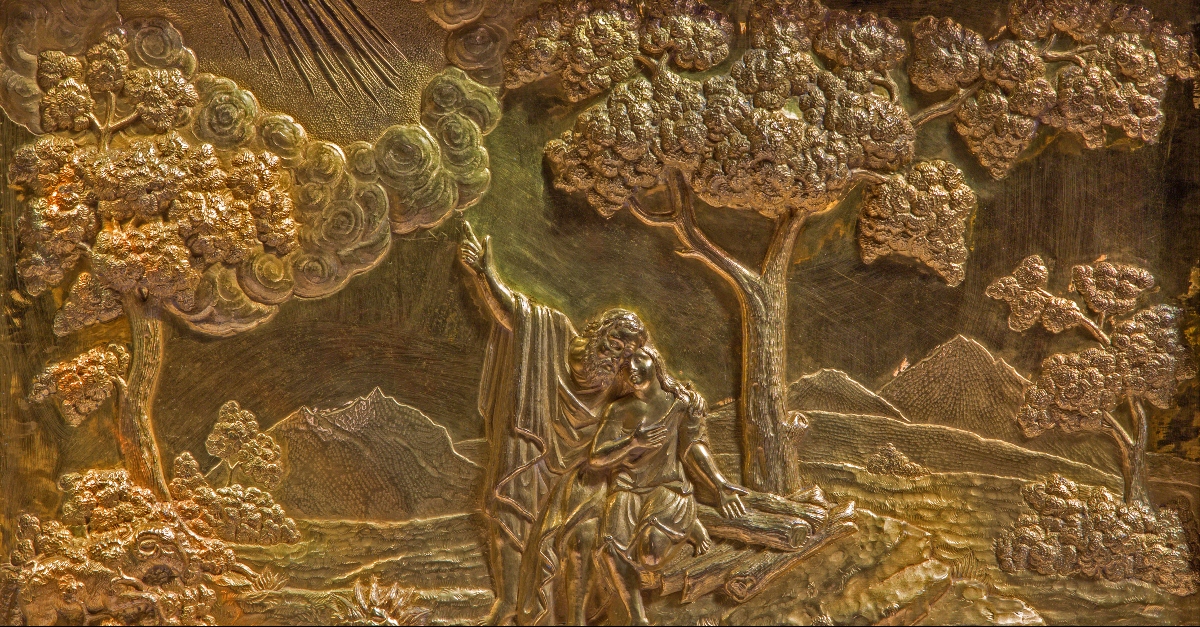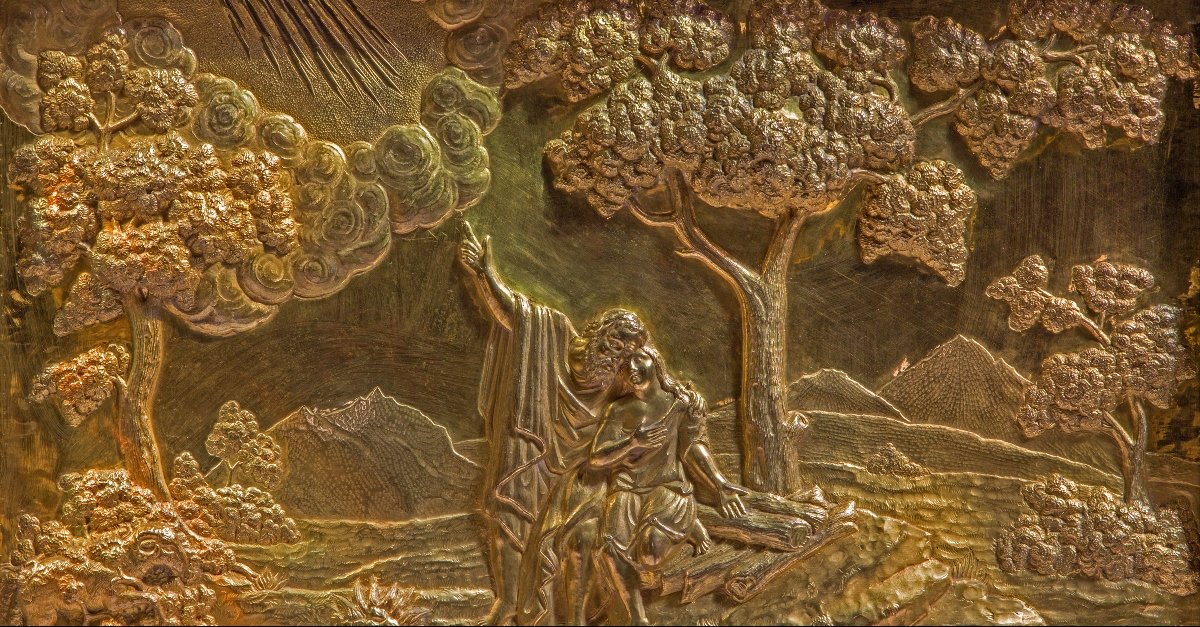[ad_1]

The Covenant of Grace
The Abrahamic Covenant is really the beginnings of the formal revelation of the covenant of grace, of God’s decision to reach into humanity and specifically save people for Himself. It comes in the form of a promise to Abraham. Abraham, who’s the son of an idolater, who did not know God. God takes the initiative with him, calls him into a relationship with Himself, and makes just unilaterally some promises to Abraham. He promises that Abraham is going to be a great nation, that he is going to be given a land, a place to live, and that through Him, all of the nations will be blessed.
Genesis 12
Now that promise that’s given in Genesis 12 takes on a very formal, a covenantal form, later on in Genesis, in which God reaffirms the promises and takes an oath, basically makes a lasting promise to Abraham that He will not fail to come through on this.
Origins of Abrahamic Covenant
Normally, when a covenant was made in the ancient Near East, they would talk about the covenant being cut. The cutting of the covenant involved the sacrificing of animals. Animals would be literally cut in two. The person who had to keep the promises would walk through those animals, basically saying, “If I don’t keep my end of the bargain, may be done to me what has been done to these animals.” Typically, in a covenant, the great king would force the lesser party in the covenant to walk through those animals. It was up to the junior member of the party to keep the terms of the covenant.
What’s so amazing in the Abrahamic Covenant is that God Himself takes the threatened curses upon Himself, guaranteeing, as He walks through those animals that are cut in two, that He will certainly bring this promise to pass.
Genesis 17
Later on, in Genesis 17, the promise is given a specific sign with the sign of circumcision. Abraham and his son, Ishmael, are circumcised, making clear that they and all of their household are set apart to the Lord. This covenant, this promise, of blessing to Abraham, to Abraham’s seed, and then to the nations through Abraham really is the beginning of the covenant of grace that’s going to find its fulfillment in Jesus Christ.
3 Tenets of the Abrahamic Covenant
1. To make from Abraham a great nation and bless Abraham and make his name great so that he will be a blessing, to bless those who bless him and curse him who curses him and all peoples on earth would be blessed through Abraham.
2. To give Abraham’s descendants all the land from the river of Egypt to the Euphrates. Later, this land came to be referred to as the Promised Land or the Land of Israel.
3. To make Abraham the father of many nations and of many descendants and give “the whole land of Canaan” to his descendants. Circumcision is to be the permanent sign of this everlasting covenant with Abraham and his male descendants.
The Purpose of the Abrahamic Covenant and its Fulfillment
In the Abrahamic Covenant, the Lord repeated the covenant promise to three generations, Abraham, Isaac, and Jacob. All three were promised land, many descendants, and a blessing from the Lord. Abram was called out of Ur of the Chaldees to Canaan, and the Lord established a covenant with Him (Genesis 12:1-3). The Lord reaffirmed the same covenant He made with Abraham’s son, Isaac (Genesis 21:12; 26:3-4). Later, the covenant was affirmed with Isaac’s son, Jacob (Genesis 28:14-15). (excerpt provided by Dave Jenkins, God of Abraham)
To better understand the significance of these points, consider the following:
- The Lord is distinguished as the God of Abraham, Isaac, and Jacob from the gods of Egypt.
- The Lord is distinguished as the God of Abraham, Isaac, and Jacob because the children of the covenant would inherit the land.
- The Promised Land was meant to help remind the people of Israel of the covenant given to Abraham.
- In Acts 3, Peter preaches to the Jews in the temple, reminding them that they belong to the God of Abraham, Isaac, and Jacob.
- Peter and John heal a lame man, and Peter attributes this miracle to the God of Abraham, Isaac, and Jacob and gives Him glory (Acts 3:1-13).
- The miracle with the lame man sets up a bold contrast (Acts 3:13) for the Jews handed Jesus to Pilate to be killed (Acts 3:15).
- Peter also instructs his hearers that the God of Abraham, Isaac, and Jacob is fulfilling the covenant of Abraham (Acts 3:25).
- The God of Abraham, Isaac, and Jacob has a plan for the ages involving the Lord Jesus, who provides forgiveness for sins and reconciliation with God.
- Such a plan was set in motion when God called Abram and blessed him, which was fulfilled when Jesus died and rose again.
- The God of Abraham, Isaac, and Jacob blessed the nations of the world.
How Does God’s Promise to Abraham Affect the Whole World?
In Genesis 12, the Lord appeared to Abraham and he made a number of promises to Abraham. His promises included that God would bless Abraham, that God would make a great nation out of Abraham, but also that God, through Abraham, would bring blessing to all the nations of the earth. As we read from Genesis 12 onward, we begin to see that God starts to fulfill those covenant promises. At the beginning, the blessings and the promises are centered around Abraham personally. He and his wife, Sarah, were barren, and God miraculously brings about the conception of Isaac. Sarah’s past the normal age of giving birth to children but God provides a miracle and Isaac is born.
God’s blessing is evidenced in Abraham’s life personally, as he gets Abraham out of several predicaments that Abraham got himself into, in dealing with Pharaoh and dealing with Abimelech. Now, as Abraham’s descendants began to multiply, we see this in Exodus, for example, God’s hand is upon the descendants. They’re greatly increasing in Egypt, they’re made slaves, and God comes in, he delivers the Israelites from Egypt, and he brings them into the land of Canaan. He establishes the descendants of Israel into a kingdom. He establishes them into a nation. Now, in these days, we begin to see the blessing going forth beyond the borders of Israel. In one sense, through the judgments, Egypt begins to know and have a knowledge of the Lord. As they’re moving into the land of Canaan and beginning the conquest of the land, for example, we have a woman named Rahab who comes into the knowledge of God and is blessed because she changes her allegiance from her old God to the God of Israel.
As the nation of Israel is established, we see an example of someone like Ruth, who comes along and she changes her allegiance from her gods to the God of Israel. Now, the fullness and how the blessing of how all the earth is going to be blessed through Abraham doesn’t come about, in large measure, until Jesus Christ is born. Matthew identifies Jesus as a descendant of Abraham and Jesus Christ is identified, as the Bible, as God’s unique son. He is Savior and Lord of the entire earth. And so Jesus commissions his apostles and disciples to go forth and to make disciples all the nations, to take that saving message about himself to the uttermost parts of the earth. And we began to see that story displayed in the Book of Acts as the gospel makes its way through Israel and the gospel makes its way to the Samaritans, and the gospel begins to make its way outside the borders of Israel.
And once again, we see in the picture of revelation five and revelation seven, that the gospel of Jesus Christ will be successful, it will penetrate all nations, it will penetrate all language groups, it will penetrate all tribes, and a number of men, women, and children will be saved by the gospel of Jesus Christ.
Photo Credit: ©iStock/Getty Images Plus/sedmak
[ad_2]
Source link







You must be logged in to post a comment.